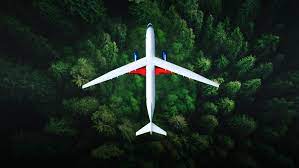Courtesy : www.proponent.com
Green aviation
According to NASA, green aviation is the pursuit of reductions in noise pollution, greenhouse gas emissions, and fuel usage to lower carbon emissions and enhance the efficiency of aircrafts. For decades, aerospace has been considered a major polluter. However, these environmental impacts have not gone ignored by the industry. Today, civil aerospace spends roughly $15 billion a year on sustainability-related research and technology development to help cut down the industry’s carbon emissions. As a result, big changes are infiltrating the industry of flight by pursuing technologies like green aviation development.
Noise Pollution Matters
Airplanes are notorious for noise pollution. Some neighborhoods located under flight paths have claimed a reduction in home values by nearly 30% when compared to outside locations. However, manufacturers like Rolls Royce are working toward a solution. Rolls Royce has been able to reduce engine noise significantly for both Airbus and Boeing customers by pursuing quieter engines through acoustic liners and the optimization of fan, turbine, and compressor construction. In fact, the Boeing 787 Dreamliner aircraft, known for its fuel efficiency, utilizes a quieter engine for this very goal.
Greenhouse Gas Emissions
The aviation industry produces 2% of the world’s CO2 emissions, according to the Intergovernmental Panel on Climate Change. As aircraft fly, jet fuel is burned and releases carbon, water vapor, nitrous oxides, sulfate, and soot into the air. The carbon released bonds with the oxygen in the air to form carbon dioxide. While carbon dioxide isn’t affected by altitude, the remaining emissions are found to have a higher impact on the environment at higher altitudes, where aircraft are flying. Aircraft are seeing a reduction in these emissions with the industry turning towards improving fuel consumption and fuel varieties such as green aviation.
.
Improving Fuel Consumption
Even before the recession of 2008, major airplane manufacturers like Boeing and Airbus) had begun pursuing more eco-friendly aircraft improvements similar to green aviation. By 2010, Airbus introduced the A320neo, reducing fuel consumption by nearly 16%. On its heels came Boeing’s 787 Dreamliner, reducing usage by roughly 20%. Since then, reductions to consumption have been a high priority with each new model. It’s this pursuit that has brought about the flight of Boeing’s ecoDemonstrator, a highly recyclable aircraft with tremendous improvements to aircraft weight, drag, and other components influencing fuel efficiency.
Alternative Fuels Aren’t Just for Cars
When most people think of green aviation, fuel consumption is the first thing that comes to mind. While improvements to fuel efficiency are an important part, diversifying fuel types is just as vital. Today, the aviation industry is pursuing several alternatives to traditional oil, including Honeywell’s Green Jet Fuel, ethanol, and even bio-kerosene in order to identify better methods of powering aircraft and reducing emissions. Major airlines, like United and Virgin Atlantic, are making pledges toward utilizing these innovative fuels.
Green Aviation Involves the Supply Chain
Here at Proponent, (formerly Kapco Global), we value green aviation. As a result, we have made our own internal strides toward developing and adopting environmentally sound practices and technologies. It’s these practices like green aviation that have earned us ISO 14001 certification of our UK facility; which is an international standard environmental management system for improving environmental performance. Our belief is that excellent customer service includes proper treatment of our environment.




